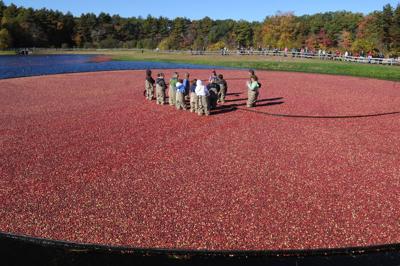
Local farms greatly decrease the carbon emissions required to transport produce all over the world.
In Massachusetts, many of our local farmers have proudly grown the official state fruit for centuries: cranberries. But cranberry farmers are facing a threat that requires local government to act now to save this key part of our historical identity.
Cranberries grew naturally in Massachusetts long before the founding of the Commonwealth. Native Americans used the berry for a variety of purposes, and taught the earliest Pilgrims these valuable uses. The cranberry growing process improved immensely in 1816 when sand was introduced to the cultivation of Massachusetts bogs.
Sand is now an integral part of growing cranberries. Every two to five years, farmers apply a layer of sand to their bogs as a natural method of promoting growth, improving plant productivity, decreasing the likelihood of diseases, and reducing harmful insect populations.
Part of the reason why Massachusetts is the perfect place to grow cranberries is the large concentration of sand in our soil. Naturally occurring sand is easily removed from the soil and used on cranberry bogs, thereby reducing the need to purchase expensive sand to be trucked in from far flung regions, while also decreasing the need for fertilizers, pesticides, and herbicides. Sanding bogs is part of the important practice of local farming that our laws protect.
Article XLIX of the Massachusetts Constitution provides broad protections for local farmers in their use of the land.
The Dover Amendment further protects farmers from oppressive local government, stating, “[n]o zoning ordinance or by-law shall … unreasonably regulate, or require a special permit for the use of land for the primary purpose of commercial agriculture.”
Finally, the model “right-to-farm” by-law adopted by many towns ensure that “agricultural activities may occur” at any time and “shall include the attendant incidental noise … and fumes associated with normally accepted agricultural practices.”
With these laws as a shield, farmers rely on local governments to defend and enhance local agriculture.
Unfortunately, we have seen cases of local governments bending to the few loud voices that attempt to shout these farms out of business, while forgetting the greater benefits of local farms.
This is the situation in the southeastern Massachusetts town of Halifax, where a 45-year-old family cranberry farm is facing obstacles to its existence because neighbors oppose the noise, trucking, and sand removal that cranberry farming operations require.
In Halifax, the town government and local community have a great opportunity to stand tall for their local farmers simply by following state law and Halifax’s right-to-farm by-law.
Local tax dollars certainly are better spent on local services like police, firefighters, and teachers rather than imperiling local farmers.
It is important to hold strong against efforts to effectively shut down local farms.
We hope town officials in Halifax do the right thing for local farms. Before local farming becomes extinct.


